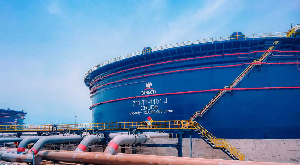Nigeria’s biggest refinery, Dangote Petroleum Refinery, has accused leading fuel importers of sabotaging its operations and defrauding Nigerians through inflated petrol consumption data, fraudulent subsidy claims, and the supply of substandard products.
In a paid advertorial response to the Depot and Petroleum Products Marketers Association of Nigeria (DAPPMAN), Dangote alleged that the widely quoted daily petrol consumption figure of 93 million litres is “grossly overstated,” insisting actual demand is less than half that.
Dirty petrol, subsidy fraud, and round-tripping
According to the company, these inflated figures were used for years to justify subsidy payments, crude swap deals, and equalisation fund claims—while ordinary Nigerians endured fuel shortages and adulterated products.
“The Nigerian consumer has been systematically exploited for years through inflated data and fraudulent practices. The reality is that the country consumes far less petrol than what is being claimed by importers,” the refinery said.
According to Dangote’s statement reported by BusinessDay, members, including Matrix, AA Rano, AYM Shafa, and NIPCO, were accused of importing low-quality petrol in 2022 that contained over 15% methanol, a chemical mix that damaged thousands of engines nationwide.
The refinery alleged that such practices, alongside inflated consumption claims, enabled round-tripping and drained public funds running into trillions of naira.
It called for a forensic audit of fuel importers’ records, equalisation payments, and regulatory revenue accounts. Publishing their financial statements for the past decade, the company said, would reveal the scale of the alleged fraud.
Questionable certificates of quality
Dangote also raised red flags over how imported fuel is certified. It dismissed claims that it supplies only 35% of Nigeria’s petrol demand, stressing that regulators have failed to publish transparent or independently verified daily consumption figures.
Without reliable data, the refinery said, proper quota allocation and planning under Nigeria’s Petroleum Industry Act (PIA) remain impossible.
Price comparisons and market reform
Dangote also pushed back against comparisons of its prices with those in neighbouring Togo.
It noted that the average pump price in Lomé stands at 680 CFA francs per litre (₦1,826)—far higher than Nigeria’s ₦865.
The company argued that its refinery has positioned Nigeria as West Africa’s hub for affordable petrol, even though more than 60% of its crude feedstock is imported.
DAPPMAN has yet to respond to these allegations, but had accused the refinery of selling fuel cheaper in other countries than in Nigeria.
The bigger picture
Dangote maintained that resistance from fuel importers is not about consumer welfare but about protecting arbitrage opportunities.
“It is increasingly clear that DAPPMAN and some of its members remain disproportionately focused on the importation of refined products,” the refinery said.
For Nigerians, the battle could determine whether petrol becomes cheaper and more stable—or whether entrenched interests keep fuel prices artificially high.
Business News of Tuesday, 16 September 2025
Source: www.legit.ng













